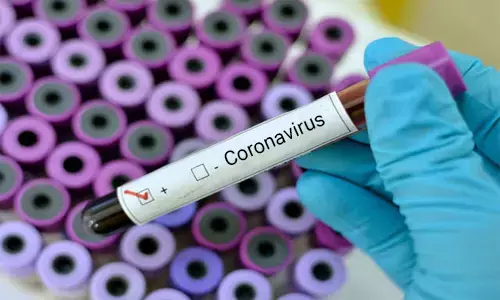- Home
- Medical news & Guidelines
- Anesthesiology
- Cardiology and CTVS
- Critical Care
- Dentistry
- Dermatology
- Diabetes and Endocrinology
- ENT
- Gastroenterology
- Medicine
- Nephrology
- Neurology
- Obstretics-Gynaecology
- Oncology
- Ophthalmology
- Orthopaedics
- Pediatrics-Neonatology
- Psychiatry
- Pulmonology
- Radiology
- Surgery
- Urology
- Laboratory Medicine
- Diet
- Nursing
- Paramedical
- Physiotherapy
- Health news
- Fact Check
- Bone Health Fact Check
- Brain Health Fact Check
- Cancer Related Fact Check
- Child Care Fact Check
- Dental and oral health fact check
- Diabetes and metabolic health fact check
- Diet and Nutrition Fact Check
- Eye and ENT Care Fact Check
- Fitness fact check
- Gut health fact check
- Heart health fact check
- Kidney health fact check
- Medical education fact check
- Men's health fact check
- Respiratory fact check
- Skin and hair care fact check
- Vaccine and Immunization fact check
- Women's health fact check
- AYUSH
- State News
- Andaman and Nicobar Islands
- Andhra Pradesh
- Arunachal Pradesh
- Assam
- Bihar
- Chandigarh
- Chattisgarh
- Dadra and Nagar Haveli
- Daman and Diu
- Delhi
- Goa
- Gujarat
- Haryana
- Himachal Pradesh
- Jammu & Kashmir
- Jharkhand
- Karnataka
- Kerala
- Ladakh
- Lakshadweep
- Madhya Pradesh
- Maharashtra
- Manipur
- Meghalaya
- Mizoram
- Nagaland
- Odisha
- Puducherry
- Punjab
- Rajasthan
- Sikkim
- Tamil Nadu
- Telangana
- Tripura
- Uttar Pradesh
- Uttrakhand
- West Bengal
- Medical Education
- Industry
Coronavirus vaccine in foray? Researchers say the rollout could take time

Delhi: Amidst the recent 2019 Novel Coronavirus (2019-nCoV) outbreak that has reportedly claimed the lives of more than 360 people in China, the researchers and labs worldwide are making continuous efforts to craft a vaccine for the deadly virus.
According to the researchers, an effective vaccine could be created in a matter of weeks, using advanced techniques. Any new vaccine will still face manufacturing and regulatory hurdles that would take months to surmount.
Coronaviruses (nCoV) are a large family of viruses that cause illness ranging from the common cold to more severe diseases such as Middle East Respiratory Syndrome (MERS-CoV) and Severe Acute Respiratory Syndrome (SARS-CoV). A novel coronavirus is a new strain that has not been previously identified in humans. Common signs of infection include respiratory symptoms, fever, cough, shortness of breath and breathing difficulties. In more severe cases, the infection can cause pneumonia, severe acute respiratory syndrome, kidney failure, and even death.
The Wuhan coronavirus outbreak has already been declared a global public health emergency by the World Health Organization.
The high-profile efforts at developing a coronavirus vaccine include:
- A Massachusetts biotech company called Moderna is developing a vaccine genetically designed by researchers at the U.S. National Institutes of Health (NIH), according to the Washington Post. The NIH hopes to have safety trials for this vaccine underway by April.
- A Philadelphia biotech firm, Inovio, is gearing up for lab and animal testing of a vaccine of its own design. The effort is backed by a $9 million grant from the Coalition for Epidemic Preparedness Innovations, according to The New York Times.
- Pharmaceutical industry leader Johnson & Johnson is also working on a vaccine, but its top scientists say it could take up to a year to bring the vaccine to market, CNBC reports.
Getting millions of doses of coronavirus vaccine into the hands of doctors and the arms of patients is a more complicated process, said Florian Krammer, a professor of vaccinology at the Icahn School of Medicine at Mount Sinai, in New York City.
The problem is that there are no vaccines on the market for any coronavirus, not even SARS or MERS, Krammer said.
If this were the flu, manufacturing could be more easily spun up because the technology is in place to mass-produce the annual flu vaccine, Krammer said.
"The truth is it's going to take a few months until there is a vaccine available for testing," Krammer concluded. "Then the main question that remains is how long it will take to produce, once the U.S. Food and Drug Administration allows its use in the population. How much time do we need to make sufficient doses?"
Dr Kamal Kant Kohli-MBBS, DTCD- a chest specialist with more than 30 years of practice and a flair for writing clinical articles, Dr Kamal Kant Kohli joined Medical Dialogues as a Chief Editor of Medical News. Besides writing articles, as an editor, he proofreads and verifies all the medical content published on Medical Dialogues including those coming from journals, studies,medical conferences,guidelines etc. Email: drkohli@medicaldialogues.in. Contact no. 011-43720751


